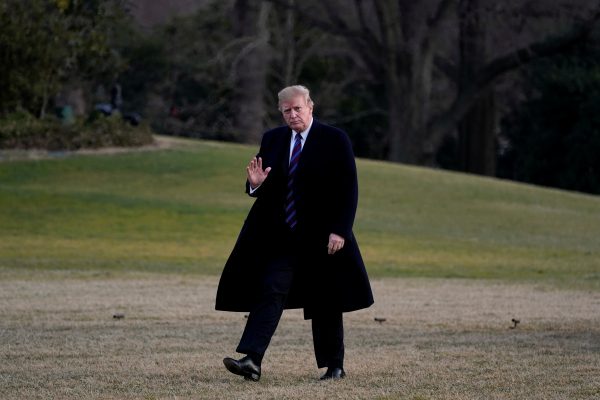The United States was the crux of the economic and political security system on which the world has relied for more than three-quarters of a century. The global economic architecture which the United States and its allies put in place after World War II is now absent US leadership and care. Mr Trump and his team have trashed it. Trump’s trade war with China and his trade actions against others, including US allies like Japan, Europe and Canada, show utter disrespect for its core rules. This system is the international system of rules, whatever its weaknesses, on which Asia’s political security also vitally depends.
The wreckage of Mr Trump’s approach to foreign policy continues to pile up across Asia and around the world.
The immediate outlook, over the next year or two, promises rising economic and political uncertainty. The real estate market bargaining style that Mr Trump has brought to dealing with these issues undervalues the complex interdependence between the economic and political security interests that are at stake. It undervalues the damaging multilateral consequences of bilateral dealing. That’s what is so risky about the bilateralisation of the US trade negotiations with China, which as the largest trading nation in the world is wisely bound into the multilateral global trading regime. Japan too is under pressure to do a bilateral trade deal with Mr Trump — a deal that goes beyond the multilateral commitments it has made to members of the so-called TPP-11. On the US trade conflict with China, there’s a deepening perception gap with Washington, and diplomatic realignment despite the deep security undertow in some countries.
Asian policy leaders are still coming to terms with the reality that Mr Trump is different and that the United States which delivered his electoral success is never likely to be quite the same. But there’s a growing understanding in Tokyo, Jakarta and even Canberra of what’s at stake in dealing with Mr Trump’s administration and the more proactive response that will be needed to defend core Asian economic and political interests that transcend the anxieties that exist between a rising China and the rest of Asia.
In this week’s lead essay Sheila Smith argues that based on the past performance of the Trump administration, US policy in Asia will ‘be erratic and self-serving’ in the coming year as the Trump administration continues ‘to work out its issues with countries in the region bilaterally and sporadically’. The ‘more openly pugilistic US relationship with China’, she says, ‘unsettles nerves’ across the region.
But the main problem for US foreign policy makers, Smith reckons, is not the behaviour of other global actors, including those in Asia or elsewhere. The main problem is the ‘crippling divisions within the Trump administration itself, and between the administration and the legislative and judicial branches of the US government, [that] could make any attempt to marshal US resources into foreign relations almost impossible’.
The coming year, as Smith says, will likely be a year of domestic political entanglement for the President and his administration. The effect of the political turbulence surrounding the White House and the extent to which it dominates US foreign policy is one dimension. But the lack of focus and consistency in the direction of foreign policy strategy is an altogether higher order concern. Diminished expertise and experience at all levels of the Trump administration undermine the trust that allies, partners and even adversaries can put in the reliability of US posturing.
In the short term, these worries are focused on Mr Trump and his administration. Some think that Trump will have more freedom to pursue his ambitions for ‘America First’ around the world. The immediate issue is how to respond to the ‘America First’ momentum in all its dimensions. But even if there are fewer experts in the government to challenge Mr Trump’s vision, implementation of his goals remains a challenge, especially against what now appears to be comprehensive pushback by the US security community in almost every theatre.
The turmoil at home, Smith warns, could produce more brittle and reactive decisions. This could bedevil meaningful dealings with others around the globe because of the instinct to seek settlement prematurely, in the trade war with China or denuclearisation in North Korea, for example, instead of pursuing stable, long-lasting agreements that serve the interests of the United States as well as its partners.
The crises Mr Trump proudly proclaims that he alone could have dealt with are largely of his own making. It’s hardly surprising that Asian allies and partners alike should worry about how Mr Trump might deal with a real crisis when there’s a significant move within the US Congress to put limits on the president’s use of nuclear weapons.
The chances that the Trump administration, in this mode, will succeed in mitigating global-system destabilising trade and other tensions with China or, alone, secure an agreement on denuclearisation with North Korea appear remote.
Only multilateral engagement on both these and other issues such as climate change is likely to deliver stable, mutually advantageous outcomes to the United States and all its partners in any of these areas. That’s not on Mr Trump’s agenda.
The real worry is that beyond Trump’s presidency all the signs suggest that both the impulse of the United States to engage multilaterally will be very difficult to repair and that Mr Trump has fractured trust in multilateral endeavours around the world.
The EAF Editorial Board is located in the Crawford School of Public Policy, College of Asia and the Pacific, The Australian National University.

